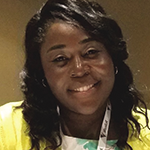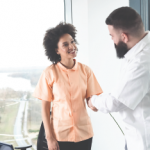ATLANTA—The Hospital for Special Surgery (HSS), headquartered in New York City, uses community-based participatory research (CBPR) models to develop patient programs. One popular self-help program for arthritis patients evolved from a different initiative focused on orthopedic pain management, according to speakers in a session at the 2019 ACR/ARP Annual Meeting.
According to Titilayo Ologhobo, MPH, associate director of outcomes in public and patient education at HSS’s Education Institute, CBPR empowers vulnerable communities to make decisions about the health of their community while helping reduce health disparities, particularly in underserved communities.
“By engaging and collaborating with the community, researchers can identify what the disparities are for that particular community,” said Ms. Ologhobo. “It involves active community participation throughout the process right from the start. Most importantly, it ensures that our interventions are responsive to the community’s actual needs.”
Assess the Community
Before developing a CBPR, a community health needs assessment must be undertaken, Ms. Ologhobo said. In addition to a geographic area, a community can include shared interests, values or characteristics, such as age, gender and occupation.1-4 “A big part of a successful program requires understanding the cultural groups within the community and how best to work with these groups,” said Ms. Ologhobo.
It’s also important to identify key assets and resources that may be available, including people, volunteers, community leaders, and research and academic organizations that may have expertise and data they’re willing to share. “This will help you develop the scope of the project to achieve the greatest impact by leveraging your strengths and not straining your resources,” Ms. Ologhobo said.
In 2019, 11,430 patients, community members and other stakeholders completed surveys (available in the four most prevalent languages spoken in the community) that queried what they thought were the most important health needs HSS could address.

Ms. Ologhobo
HSS Educational Institute staff then conducted eight community forums to share the survey results. “[Community members] were anxious to hear what we uncovered, partially because we kept bugging them to fill out the surveys,” said Ms. Ologhobo. “They were appreciative that we shared the results with them.”
Using a simple 10-point system based on the community’s input on priorities, HSS staff compiled a list of the 25 most important community health needs. That list was then ranked into a top 10 list. “It was unrealistic for us to address all 25 needs,” said Ms. Ologhobo. “We would have been overwhelmed and been stretched too thin and less effective.”
The top 10 items selected for focus were: 1) osteoarthritis; 2) osteoporosis; 3) joint, muscle and bone pain; 4) falls and balance; 5) rheumatoid arthritis; 6) stress and mental health; 7) lifestyle (i.e., poor diet and lack of exercise); 8) fatigue; 9) stiffness; and 10) complementary alternatives to manage pain.
“This has been a very rigorous process,” said Ms. Ologhobo. “Including the community in prioritizing health needs helped aim us in the right direction in selecting public health priorities and guide us in developing and implementing our new programs.”
Robyn Wiesel, MCHES, associate director, public and patient education, HSS Education Institute, said staff have found that the more buy-in you can get and the more partnerships and connections you can make, the further you can scale programs. But relationships change, and new opportunities arise, “so it’s important to evaluate and make the changes and adjustments that become necessary.”
Developing Self-Management Education & Programs
One option being developed at HSS to increase outreach and effectiveness—without straining resources—is self-management programs. These initiatives focus on support and education provided by clinicians and public health practitioners to enhance an individual’s self-efficacy in managing one or more chronic conditions.5-7
“Today, things are really hard for the physician to be the best educator they can be for their patients, especially with time constraints,” said Ms. Wiesel. “So at HSS, we’re developing self-management education programs based on the prioritized health needs of our patients and our community.”

Ms. Wiesel
Building patient confidence is a key consideration. Ms. Wiesel said HSS staff are already seeing positive impacts on patients’ health outcomes and patient satisfaction. “Our research shows that patients involved with self-management with the right support and training feel empowered to take control of their condition. Now they don’t just show up for their appointments; they’re involved.”
Program development goals at HSS are to increase participant awareness and knowledge of self-management techniques, educate participants on coping strategies to use when managing symptoms and provide opportunities to practice learned skills. Ms. Wiesel said these goals are applied to all the programs HSS implements.
HSS self-management education programs consist of lectures, often with a doctor teaching a group from a podium, and workshops for small groups led by experts. Usually, there are monthly meetings, with more frequent support available via telephone. Voluntary exercise programs are typically offered once or twice a week to help with fitness and balance. Programs are also recorded and put in the library. Many of them become available online.
All goals must be measurable to validate effectiveness.
Program effectiveness and impact are constantly being evaluated through pre- and post-assessments, according to Ms. Wiesel. Assessment tools include participant phone interviews, debriefing sessions and the compilation of anecdotal statements.
“Everyone is excited at the beginning,” said Ms. Wiesel, “but one concern is how to sustain the program when people become bored since it’s no longer the newest shiny thing going on.”
One aspect HSS is always looking for is transferability. That’s how a group devoted to pain management in an orthopedic clinic morphed into a program for rheumatology patients.
Will This Work for Rheumatology?
HSS Education Institute staff wondered if patient groups in addition to orthopedic patients might benefit from a similar program. “The resounding answer was, ‘yes, rheumatology!’” said Ms. Wiesel.
The staff also realized rheumatology patients had different needs, such as for pain management, than orthopedic patients, and a new program would require key changes. Also, rheumatology patients need movement to loosen their joints. An expert in therapeutic yoga was hired to implement the rheumatology program.
The new rheumatology program was launched this past year, with the yoga instructor offering monthly classes in meditation and deep relaxation techniques to patients. She also teaches patients how to loosen their joints at home without hurting themselves.
So far the program has been effective. “Our surveys have found that patients are dealing with their pain much better, and they tell us they’re using what they’ve learned at home,” said Ms. Wiesel.
Here are some of the results from post-assessments and worksheets completed by participants:
- 79% said they have used mindful breathing techniques in place of medications;
- 97% reported the techniques they learned have helped them manage their pain;
- 100% reported using the techniques they learned to help them manage stress;
- 88% said they gained self-management skills;
- 95% said they gained knowledge about their disease;
- 96% reported they were satisfied with the program; and
- 95% would recommend the program to friends/family.
The rheumatology program has been so successful that HSS is exploring offering something similar to its post-operative, inpatient population.
Mike Fillon is a healthcare writer living in the Atlanta area.
References
- Self-management support and education. Centers for Disease Control & Prevention, Division for Heart Disease and Stroke Prevention. 2017 Dec 21.
- Why is self-management support important? Agency for Healthcare Research and Quality. 2016 Feb.
- Community-Based Participatory Research Program (CBPR). National Institute on Minority Health and Health Disparities. 2018 Oct 2.
- Van de Velde D, De Zutter F, Satink T, et al. Delineating the concept of self-management in chronic conditions: A concept analysis. BMJ Open. 2019 Jul 16;9(7):e027775.
- Ahari SS, Habibzadeh S, Yousefi M, et al. Community based needs assessment in an urban area: A participatory action research project. BMC Public Health. 2012 Mar 7;12:161.
- Community Needs Assessment. Centers for Disease Control and Prevention. 2013.
- Israel BA, Eng E, Schulz AJ, Parker EA. (2005) Methods for Community-Based Participatory Research for Health. San Francisco: Jossey-Bass. 7–9.



